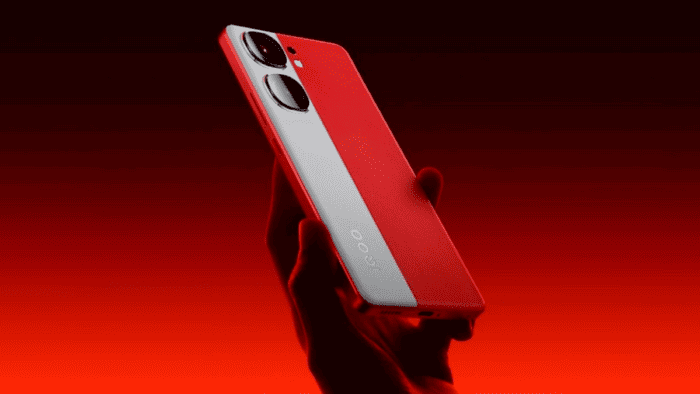After upgrading the numbered series with the iQOO 12 and iQOO 12 Pro, the hardware-focused gaming brand now is here with the iQOO Neo 9 series. The Neo series gets its latest and more advanced contenders in the form of the iQOO Neo 9 and Neo 9 Pro. The duo of cost-effective flagships has been launched today in China and arrive to replace the iQOO Neo 8 series. The iQOO Neo 9 comes with powerful hardware and premium features including AMOLED displays with a high refresh rate. These devices, however, are cheaper than the iQOO 12 and iQOO 12 Pro, giving iQOO fans more options at a lower price range. Without further ado, let’s see what they have in tow for the competitive market.
iQOO Neo 9 and Neo 9 Pro Specifications and Key Features
The iQOO Neo 9 and Neo 9 Pro come with 6.78-inch AMOLED displays with 2,800 x 1,260 pixels of resolution and 144Hz refresh rate. The panel of these devices has a 20:9 aspect ratio, 93.43% screen-to-body ratio, and HDR 10+ support. Under the hood, we can find the major difference between these two devices. The vanilla iQOO Neo 9 boasts the Qualcomm Snapdragon 8 Gen 2, whereas the Pro Model has the Dimensity 9300 chipsets. Both chipsets are 4nm, but the Dimensity 9300 gets the advantage thanks to the cutting-edge ARMv9 cores.
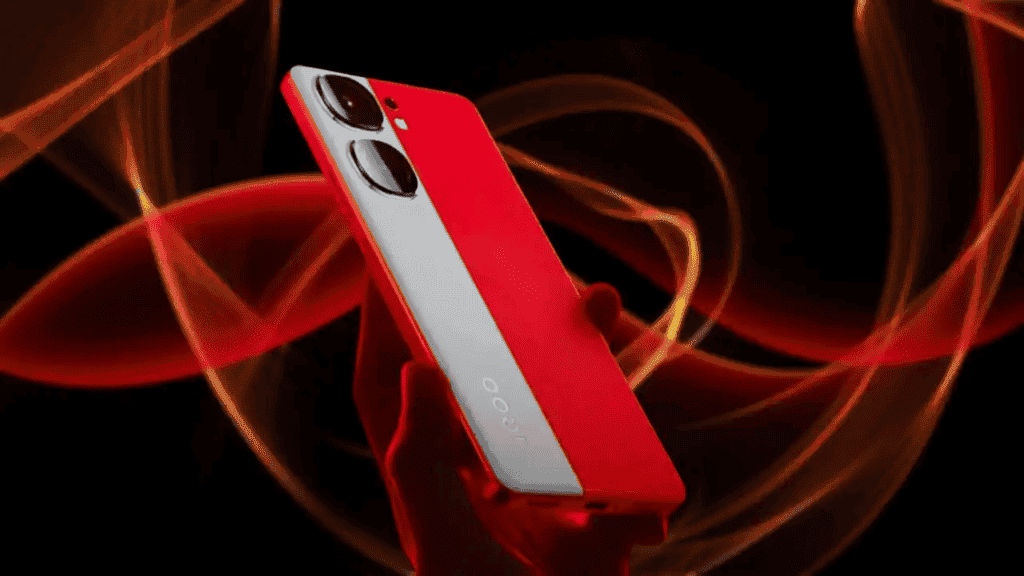
Snapdragon 8 Gen 2 and Dimensity 9300 Take the Helm
The Snapdragon 8 Gen 2 comes with 1 x ARM Cortex-X3 core clocked at 3.2 GHz, 2 x ARM Cortex-A715 cores with 2.8 GHz, 2 x ARM Cortex-A710 cores at 2.8 GHz, and 3 x ARM Cortex-A510 cores at 2.0 GHz. The chipset has the Adreno 740 which can handle all games on Play Store without any hassle. When it comes to the iQOO Neo 9 Pro it boasts the latest MediaTek Dimensity 9300 SoC with a very interesting core arrangement. It has 1 x ARM Cortex-X4 core clocked at 3.25 GHz, 3 x ARM Cortex-X4 cores at 2.85 GHz, and 4 x ARM Cortex-A720 cores at 2.0 GHz. There are no efficiency-focused cores in the Dimensity 9300 as this is a performance-focused chip. For graphics, there is a powerful Immortalis G720 GPU.
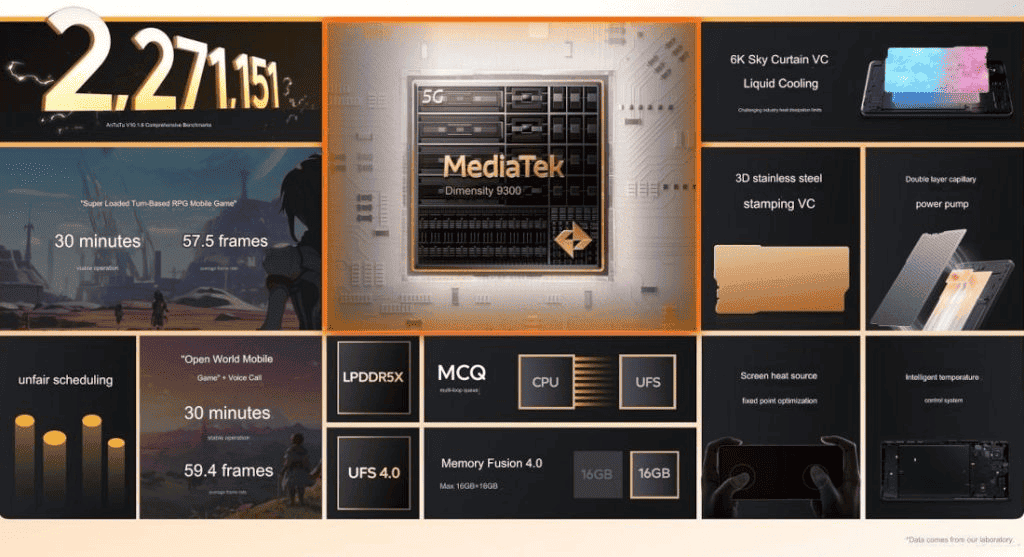
Q1 Gaming Chip and Powerful Camera Combo
Both the iQOO Neo 9 and 9 Pro run Android 14 with OriginOS 4 and they pack up to 16 GB of RAM. Both smartphones are also equipped with the Q1 Dedicated Chip that works to boost gaming performance and ensure a stable frame rate. The Q1 chip launched with the iQOO 12 series and it’s great to see it is also available with the cheaper iQOO Neo9 series. This chipset will improve your experience with games and will lift the weight of the GPU to ensure a stable frame rate and smooth refresh rate on games.
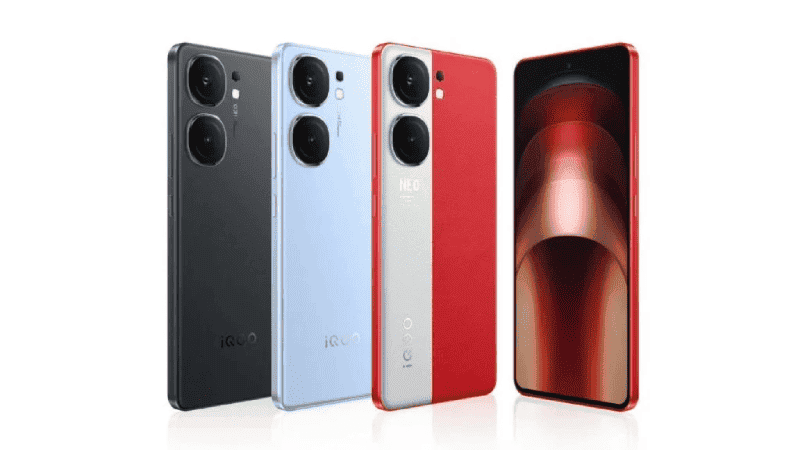
The iQOO Neo 9 and 9 Pro come with the 50 MP Sony IMX920 primary camera. The vanilla model has an 8 MP ultrawide lens, whereas the iQOO Neo 9 Pro sports a 50 MP ultra-wide lens. The two smartphones have a 16 MP snapper for selfies and video calls. Both devices have a huge 5,160 mAh battery which offers support for 120W fast charging.
Other features in the iQOO Neo 9 series include dual-SIM support, 5G SA/NSA, 4G VoLTE, Wi-Fi 7, Bluetooth 5.3, GPS, USB Type-C, NFC, and IR Blaster.
Pricing and Availability
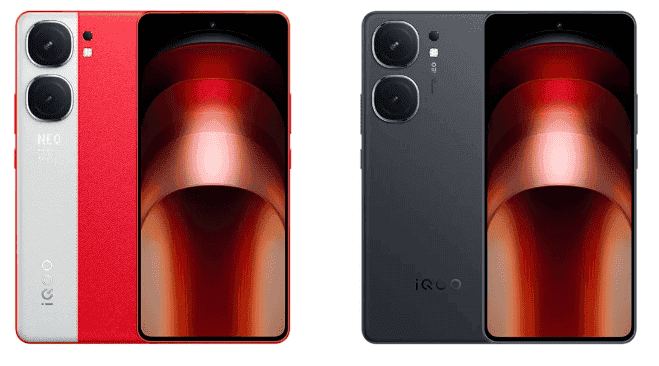
The iQOO Neo 9 series comes in three color options: Red and White, Black, and Nautical Blue. The smartphones are available for pre-order in China and will go on sale from December 30. You can check details about the pricing that depends on the RAM and Storage configuration:
iQOO Neo 9
- 12 GB / 256 GB – CNY 2,299 / INR 26,900 / $321
- 16 GB / 256 GB – CNY 2,499 / INR 29,200 / $349
- 16 GB / 512 GB – CNY 2,799 / INR 32,700 / $391
- 16 GB / 1 TB – CNY 3,199 / INR 38,600 / $447
iQOO Neo 9 Pro
- 12 GB / 256 GB – CNY 2,999 / INR 36,100 / $420
- 12 GB / 512 GB – CNY 3,299 / INR 39,800 / $461
- 16 GB / 512 GB – CNY 3599 / INR 43,400 / $503
- 16 GB / 1 TB – CNY 3,999 / INR 48,200 / $560
Conclusion
The New iQOO Neo9 series are powerful yet cost-effective smartphones. They bring performance, great displays for gaming and multimedia, and huge batteries with fast charging. The camera performance will also be decent thanks to the use of cutting-edge modules. Both devices are interesting and should reach global markets in a few months.

